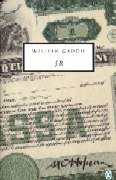|
|
J R |
||||||||||
|
J R |
194.6]
The Light Cavalry Overture: from
the 1866 operetta Die leichte Kavallerie by Austrian composer Franz
Suppé (1819-95). 194.22]
The Peanut Vendor: words
by L. Wolfe Gilbert and Marion Sunshine, music adapted by Moises Simons from
the popular Latin American song “El Mansiero” (1931). Popularized in
this country by Paul Whiteman, Guy Lombardo, and Xavier Cugat and their
orchestras. 194.29] a demented Virgil for the amorphous Dante: Virgil leads Dante through the underworld in the latter’s Inferno.
205.20]
A Moveable Feast left opened to page 190: on which page F. Scott Fitzgerald reveals
to Ernest Hemingway his suspicion of being underendowed. Crawley later uses
Bast’s “coronal extension measuring tape” as a bookmark for this page.
Fitzgerald died in 1940; Hemingway’s Parisian memoir was published posthumously
in 1964.
214.33]
Chile regarding Kennecott:
in October 1972 the Kennecott Copper Corporation reported a huge loss due to
the write-off of its equity interest of $50.4-million in El Teniente Mining
Company after Chile nationalized it (New York Times, 25 October 1972,
63). Kennecott made front-page news a month later when they were accused by
the Federal Trade Commission “of violating the law that bans the same
individual from being on the boards of directors of large, competing
corporations” (New York Times, 25 November 1972, 1). 216.26]
TDY ... CIPAP ... GS sixteen:
= Temporary Duty. CIPAP = Change In Plans Authorized Personnel. [Kenneth Colgan and MR] GS sixteen" is a rating on a salary pay scale.
218.25]
Don’t Fence Me In: words and music by Cole Porter (1944),
popularized by Roy Rogers.
222.29]
Saul on the road to Damascus: signifies
a complete change of heart; see Acts 9.
[235.1]
I was thinking of Homer, Louise Homer…" American
contralto (1871-1947), a notable Orfeo in Toscanini’s 1909 revival
of Gluck’s opera.
236.2] White Christmas: words and music by Irving Berlin (1942), introduced by Bing Crosby in the movie Holiday Inn.
236.27]
Maude Adams: American
actress (1872-1953), famous for her starring role in Peter Pan (1906-7).
242.40]
Ja, ich bin es, beide Hälften, nicht? [...] das Hintertail nicht vergessen:
Ger.:
“Yes, I am it, both halves, isn’t that so? ... For the head, yes? ...
Ah, the newspaper? ... American art, right? Black art, horrible ... the
blood! the war! ... Sexual intercourse! Shitty! ... For the lower body ...
don’t forget the rear end, eh? ... thank you, thank you.” 244.17]
the destructive element:
in chap. 20 of Joseph Conrad’s novel Lord Jim (1900), the trader
Stein equates an ideal with what he calls “the destructive element”: “A man that is born falls into
a dream like a man who falls into the sea. If he tries to climb out into the
air as inexperienced people endeavor to do, he drowns—nicht wahr? .
. . No! I tell you! The way is to the destructive element submit yourself,
and with the exertions of your hands and feet in the water make the deep,
deep sea keep you up. So if you ask me—how to be? . . . I will tell you! .
. . In the destructive element immerse.” See
also Stephen Spender’s critical study The Destructive Element
(1935). 247.21]
Schramm:
cf Ger. Schramme: scar, abrasion. 248.30]
pick up his bed and walk like the good book says:
from John 5:8. 248.36] Tolstoy’s something terribly lacking between what I felt and what I could do: from Fedya’s discussion with Prince Sergius in Tolstoy’s drama Redemption (1900), 1.4. (First used in Gaddis’s Recognitions: 606.31.)
|
||||||||||
|
Abbreviated Bibliography A. Gaddis' Books CG: Carpenter’s Gothic. 1985. New York: Penguin, 1999. FHO: A Frolic of His Own. New York: Poseidon, 1994. JR: J R 1975. New York: Penguin, 1993. R: The Recognitions. 1955. New York: Penguin, 1993. B. Gaddis’s Sources EB: Encyclopædia Britannica. 14th ed., 1929. ODQ: The Oxford Dictionary of Quotations, 1st ed., 6th impression (London: Oxford University Press, 1949). Gaddis owned this particular impression, given to him by Ormande de Kay in Paris in 1950. C. Gaddis Criticism Knight, Christopher, Hints and Guesses: William Gaddis and the Fiction of Longing, Madison: Univ. of Wisconsin Press, 1997. Wolfe, Peter, A Vision of His Own: The Mind and Art of William Gaddis, Madison & Teaneck, NJ: Fairleigh Dickinson Univ. Press, 1997. |
|||||||||||
|
J R |
|||||||||||
|
|||||||||||
